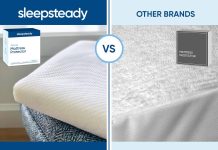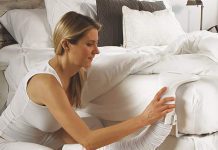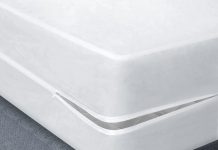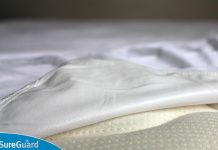In this article, we will unravel the mysteries surrounding two essential components of a comfortable sleep experience: the mattress cover and protector. While they may often be confused for one another, these two items serve different purposes and offer distinct benefits. Whether you’re looking to shield your mattress from spills, stains, or pesky allergens, or simply seeking an extra layer of comfort, join us as we explore the key distinctions between a mattress cover and protector. Prepare to gain a clearer understanding of which option best suits your sleep needs and discover how these essential bedding accessories can contribute to a restful night’s sleep.
Review contents
Definition
Mattress Cover
A mattress cover is a protective piece of fabric that is designed to encase and cover the entire mattress. It acts as a barrier between the mattress and the sleeper, providing an extra layer of protection against stains, spills, dust, and allergens. Mattress covers come in various sizes and are typically fitted with elasticized corners to ensure a snug fit.
Mattress Protector
On the other hand, a mattress protector is a specialized type of mattress cover that not only offers the same protection as a regular mattress cover but also provides additional features such as waterproofing and allergen protection. It is specifically designed to safeguard the mattress against liquids, stains, bed bugs, dust mites, and other allergens. Mattress protectors often have a zippered or fitted design to completely encase the mattress.
Functionality
Mattress Cover
The primary function of a mattress cover is to keep the mattress clean and protected from everyday wear and tear. It acts as a preventive barrier, shielding the mattress from spills, stains, dust, and other potential contaminants. Additionally, a mattress cover can add an extra layer of cushioning and comfort, enhancing the overall sleeping experience.
Mattress Protector
Like a mattress cover, a mattress protector also functions as a protective barrier for the mattress. However, it offers additional functionality by providing waterproofing capabilities. This means that it can effectively prevent liquids such as spills, sweat, and urine from seeping into the mattress and causing damage. Mattress protectors are especially beneficial for households with young children, pets, or individuals who are prone to accidents.
Material
Mattress Cover
Mattress covers are typically made from a variety of materials such as cotton, polyester, or a blend of both. These materials are chosen for their durability, breathability, and softness. Cotton covers are known for their comfort, while polyester covers are often more affordable and resistant to wrinkles and shrinking.
Mattress Protector
Mattress protectors are commonly made from waterproof materials such as vinyl, polyurethane, or a blend of both. These materials are chosen for their ability to repel liquids and prevent them from penetrating through the protector and reaching the mattress. Some mattress protectors also incorporate a layer of soft fabric on top for added comfort and breathability.
Waterproof Feature
Mattress Cover
While regular mattress covers are not specifically designed to be waterproof, they do provide a certain level of protection against spills and stains. However, they are not completely impermeable and may absorb liquids over time if not promptly cleaned.
Mattress Protector
The standout feature of a mattress protector is its ability to offer waterproof protection. The waterproof layer of the protector prevents liquids from seeping through and reaching the mattress. This feature is particularly beneficial for individuals who have children, pets, or are prone to nighttime accidents. The waterproofing also acts as a safeguard against the growth of mold, mildew, and bacteria inside the mattress.
Allergen Protection
Mattress Cover
Mattress covers provide a certain level of allergen protection by acting as a physical barrier against dust mites, bed bugs, and other potential allergens. They can trap allergens on the surface of the cover, preventing them from settling into the mattress and aggravating allergies or respiratory conditions. However, it’s important to note that regular mattress covers may not be 100% effective in completely blocking allergens.
Mattress Protector
In addition to protecting against spills and stains, mattress protectors excel in allergen protection. Many mattress protectors are specifically designed to be hypoallergenic, which means they are resistant to common allergens such as dust mites, mold, and pet dander. These protectors create an effective barrier that prevents allergens from penetrating the mattress, resulting in a cleaner and healthier sleeping environment.
Ease of Cleaning
Mattress Cover
Mattress covers are relatively easy to clean and maintain. Most mattress covers can be machine washed and dried, making it convenient to remove any dirt, dust, or spills that may have accumulated over time. It is recommended to follow the manufacturer’s instructions for proper cleaning and care to ensure the longevity of the cover.
Mattress Protector
Similar to mattress covers, mattress protectors are also designed to be easy to clean. Many mattress protectors can be machine washed, making it simple to remove stains and allergens. Some protectors also have the added advantage of being stain-resistant, which further simplifies the cleaning process. It is important to check the care instructions provided by the manufacturer to ensure the protector’s longevity and performance.
Appearance
Mattress Cover
Mattress covers come in a wide range of styles, colors, and designs. They can be plain and simple, or they can feature decorative patterns that add a touch of elegance to the bed. Mattress covers are versatile and can be easily coordinated with the overall aesthetic of the bedroom.
Mattress Protector
While mattress protectors prioritize functionality, they also come in various styles and designs. Many protectors are designed to be discreet and go unnoticed under sheets and bedding. However, there are also protectors that are explicitly designed to enhance the aesthetics of the bed, with features such as quilted patterns or a soft fabric layer on the top.
Fit and Security
Mattress Cover
Mattress covers are typically designed to have a snug fit around the mattress. They often feature elasticized corners or adjustable straps to ensure a secure and tight fit. However, it is essential to select a cover that matches the size and depth of your mattress to achieve the best fit and prevent any shifting or bunching.
Mattress Protector
Like mattress covers, mattress protectors are designed to fit securely around the mattress. Many protectors have a fitted sheet-style design and elasticized corners to keep them in place. Some high-end protectors even feature a zippered closure that completely encases the mattress, providing maximum protection and security.
Price Range
Mattress Cover
Mattress covers are available in a wide range of price points, making them accessible for a variety of budgets. The price of a mattress cover can depend on factors such as the material, size, brand, and additional features. On average, a quality mattress cover can range from around $20 to $100 or more.
Mattress Protector
The cost of mattress protectors can vary depending on the brand, material, features, and size. Generally, mattress protectors tend to be slightly more expensive than regular mattress covers due to their additional waterproofing and allergen protection capabilities. Prices for mattress protectors typically start around $30 and can go up to $200 or more for premium options.
Choosing the Right One
Types of Mattress Covers
When selecting a mattress cover, it is important to consider your specific needs and preferences. Some key factors to consider include the material, desired level of protection, ease of cleaning, and the overall fit and appearance. Cotton covers may be preferred for their natural breathability and softness, while polyester covers may be more suitable for those on a budget.
Selecting the Ideal Mattress Protector
Choosing the right mattress protector relies on understanding your specific requirements. If waterproofing is a priority, opt for a protector that specifically offers this feature. If allergies or sensitivities are a concern, look for a protector that is hypoallergenic and resistant to common allergens. Additionally, consider the fit, ease of cleaning, and the overall quality of the protector to ensure it meets your needs and preferences.
In conclusion, both mattress covers and protectors play a vital role in maintaining the cleanliness, comfort, and longevity of your mattress. While mattress covers offer basic protection against spills and stains, mattress protectors go a step further by providing waterproofing and allergen protection. The choice between the two depends on your specific needs, with mattress protectors being a preferred option for those seeking enhanced functionality and peace of mind. By carefully considering factors such as material, waterproofing, allergen protection, ease of cleaning, and fit, you can select the ideal mattress cover or protector that offers the perfect balance of protection and comfort for your sleeping environment.
































